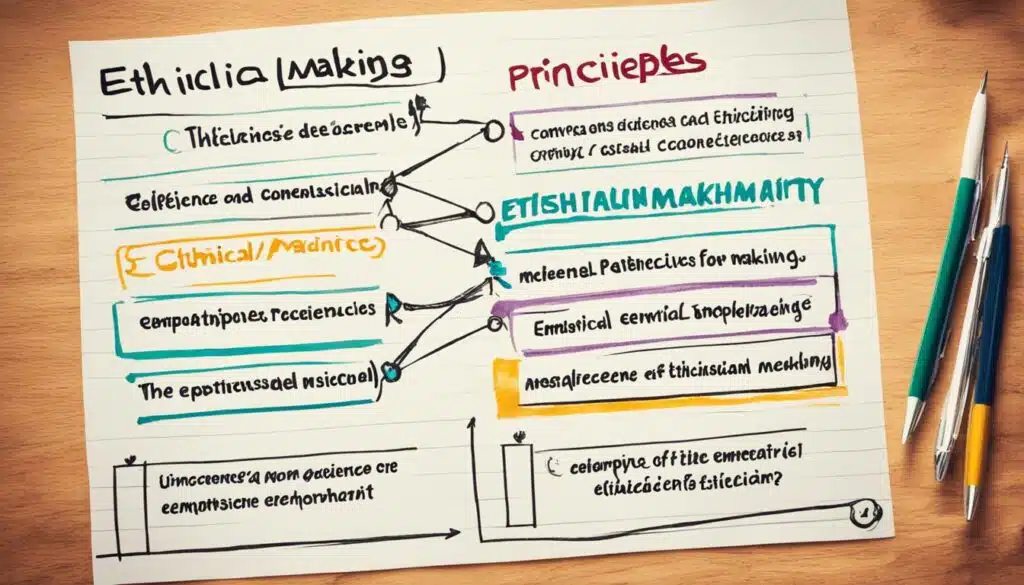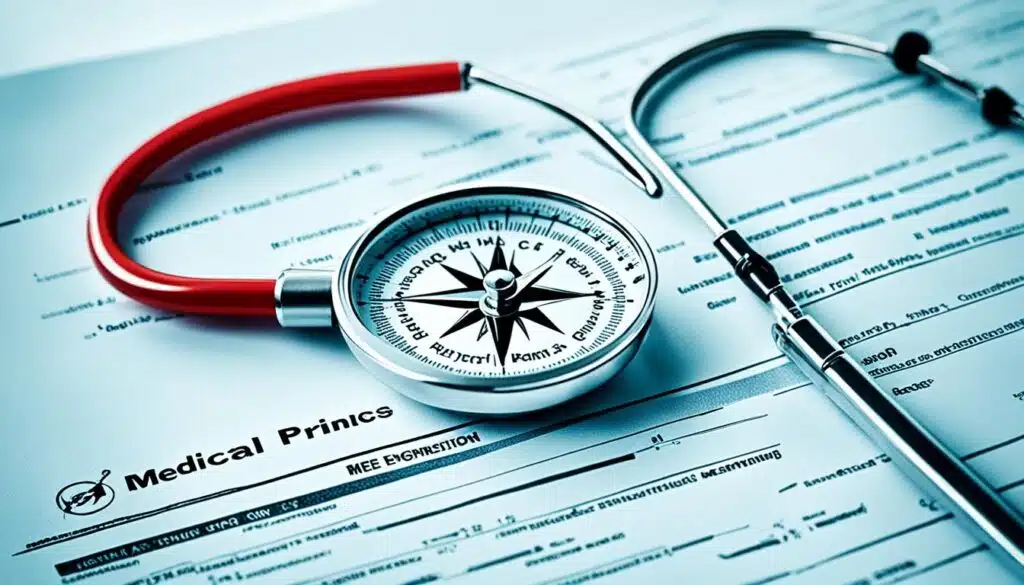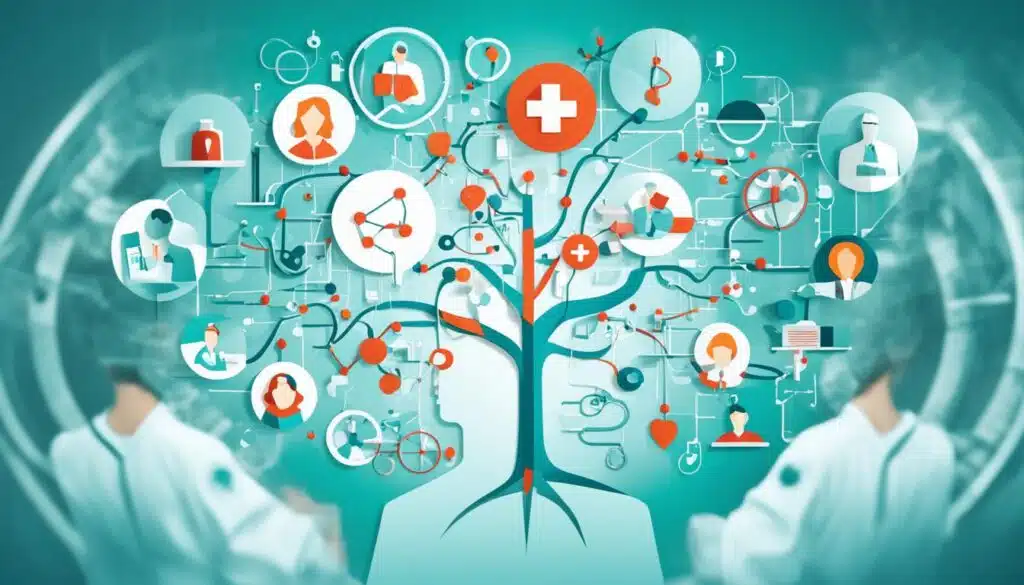Medical Ethics: Introduction to Clinical Ethics Committees
Clinical Ethics Committees (CECs), or Hospital Ethics Committees, offer support. They help healthcare workers tackle tough ethical issues that go beyond medicine. These committees are a major part of Clinical Ethics Support Services (CESS).
CECs started in the 1960s and 1970s as ethical dilemmas in healthcare grew. They give a structured way to talk about hard ethical issues during patient care. This includes making choices about end-of-life care, how to use new medical tech, and where to spend healthcare money.
Origins and Establishment
CECs came about in response to rising ethical challenges in healthcare. They offer a place to discuss and solve these issues. Patient care fields like end-of-life care, deciding on resources, and new medical tech are some areas focused on.
Functions and Responsibilities
CECs help in different ways like talking through ethics, making and changing rules, and teaching about bioethics. But unlike Research Ethics Committees (RECs), they aren’t as strictly defined. What each CEC does can vary from place to place.
In the United States, CECs have grown a lot since 1999. Back then, 93% of hospitals already had a CEC. This trend is seen in other countries too, though how each CEC is set up and what they do might change based on the local area.
Ethical Principles in Clinical Decision-Making

Healthcare workers use several key ethical principles to make decisions. These include respect for autonomy, beneficence, non-maleficence, and justice. They are the basis for tackling tough ethical issues in medicine.
Respect for Autonomy
Doctors are bound by the respect for a patient’s autonomous decisions. They let patients choose even if they disagree with the choice. This is crucial when the patient can’t make decisions alone. In such cases, a doctor considers the patient’s values to guide the treatment process.
Beneficence and Non-Maleficence
Beneficence and non-maleficence put patients first and prevent harm. Doctors make sure treatments benefit patients more than they hurt them. They choose care paths that are most helpful and least risky for patients.
Justice and Fairness
Justice means healthcare must be fair and equally accessible. But, distributing resources fairly can challenge medical professionals. They often face tough choices when medical resources are limited. Then, they have to weigh individual needs against the good of the larger community.
Ethics Consultation and Moral Distress

Ethics consultation is a key task for Clinical Ethics Committees (CECs). They help healthcare workers with tough ethical dilemmas. These talks are vital for sorting out ethical issues, sharing ideas, and learning together to respect everyone’s views and needs. This is especially true when people don’t agree about what to do.
Role in Complex Ethical Dilemmas
Being part of an ethics consultation can help healthcare teams deal with hard ethical questions. These discussions mix a lot of viewpoints and ethics principles. They make sure decisions are in the patient’s best interest, even when things are really complex.
Reducing Moral Distress in Healthcare Professionals
Healthcare folks can feel really down when they can’t care for patients as they want to. Ethics consultation is a big help here. It guides healthcare workers in difficult spots to find ethical ways out. By talking it out and giving advice, CECs help clinicians meet their duties while caring for people’s values.
Policy Formation and Revision

Clinical Ethics Committees (CECs) help develop and update ethical policies. They are vital in setting guidelines for complex healthcare dilemmas. Their work guides professionals through difficult decisions.
Developing Ethical Guidelines
CECs create standards for areas like end-of-life care and organ donation. They also tackle new technology issues. Their guidelines aid healthcare workers in choosing ethically sound paths, ensuring patients come first.
Revising Existing Policies
CECs keep institutional policies current by constantly reviewing them. This ensures healthcare keeps up with new practices and societal shifts without straying from solid ethical grounds. It’s crucial for maintaining high-quality patient care.
Bioethics Education and Training

Clinical Ethics Committees (CECs) are key in teaching bioethics to people in healthcare, patients, and everyone else. This teaching helps all parties understand the ethics behind medical choices. It makes it easier for both healthcare teams and patients to decide on care.
CECs help create a culture where thinking about ethics is vital. They aid doctors and medical workers in dealing with tough ethical issues at work. This makes their work better, as they can keep up important values like respecting principle of autonomy and doing no harm.
CECs teach people about many topics. This includes making decisions at the end of life and choosing how to use medical resources. Sessions on these topics allow healthcare workers to talk about what’s best and learn how to make ethical choices better.
CECs also help patients and their families understand a lot about healthcare ethics. They make sure people know their rights and how medical decisions are made. This approach helps everyone work together on care decisions and builds trust between patients and their doctors.
By focusing on educating people in bioethics, CECs are vital in creating a healthcare setting that meets everyone’s ethical needs. This leads to giving high-quality, morally correct medical care to all.
Medical Ethics

Principles of Biomedical Ethics
Biomedical ethics rests on four main principles: respect for autonomy, beneficence, non-maleficence, and justice. These standards guide health experts in solving tough moral dilemmas. Such dilemmas are common in their daily work.
Ethical Challenges in Clinical Practice
In daily practice, healthcare workers often encounter tough ethical choices. For example, they might have to decide about end-of-life care or how to share scarce resources. They also face new situations brought by advances in medical tech.
These challenges may cause a lot of moral stress for teams in healthcare. This shows the strong need for help from groups like Clinical Ethics Committees (CECs). They offer support in handling these tough ethical issues and making decisions.
Evaluation and Effectiveness of CECs

Despite being put in place at several healthcare spots, how well Clinical Ethics Committees (CECs) work isn’t easy to figure out. Not much research looks into this. The way CECs work is very different, making it hard to measure their results in a fair way.
User Satisfaction and Perceived Helpfulness
Research that examines CECs mainly looks at how satisfied users are. Most people involved – including medical staff, patients, and their families – see CECs as beneficial and helpful. This shows that those who use CECs feel they get the support and advice they need.
Impact on Patient Care and Treatment Decisions
Some studies indicate that asking ethics committees for advice can change how patients are taken care of. It might also help in treatment plan and feel less burdened by moral issues. But, we don’t fully informed how CECs affect actual decisions for patients and their care. There’s a big call for more detailed and thorough studies on CECs’ real influence in medical education for ethics.
Challenges and Limitations of CECs

Even though Clinical Ethics Committees (CECs) are becoming more common in health settings, they face big challenges. One issue is that CECs are not the same everywhere. They vary in how they are set up and what they do from place to place.
Variation in Structure and Functions
The way CECs work and what they do is very different. This makes it hard to judge how well they work across the board. The differences come from the local culture, the situation, and what matters most to a certain health facility. Because of this, the help they offer with ethical decisions isn’t always the same everywhere.
Resource Constraints and Funding
CECs also struggle with not having enough resources and money, especially when there is no specific budget for their work. Without proper funding, they might not be able to give the best advice on ethical issues. They might also fall short on making important policies and teaching programs.
Future Directions and Recommendations

The role of Clinical Ethics Committees (CECs) is getting more important. But they face challenges that limit their work. It’s vital to overcome these hurdles. We need to focus on making CECs more standard and merging them with other ethical support services in public health.
Standardisation and Best Practices
CECs should be more uniform in how they’re set up and run. Creating shared standards and ways to measure success is key. It can help make CECs work better, following the best ethical practices.
Integration with Other Ethics Support Services
Pairing CECs with different ethical support like ethics consultants can make decision-making better. This way, healthcare groups can use a wider set of tools to handle tough ethical issues. It all leads to top-notch, ethical care for patients.
Also read : Understanding The Dangers Of Microvascular Diseases And How To Manage Them
FAQs
What is the role of medical ethics in healthcare?
Medical ethics are vital in practice of clinical medicine and practice of medicine. They guide doctors and nurses through tough ethical dilemmas. A key part is the trust between doctors and patients. Doctors vow to always put the patient first.
Q: What is the role of ethics committees in clinical decision-making?
A: Ethics committees play a crucial role in providing guidance and advice on ethical issues that arise in clinical practice, helping physicians navigate complex moral dilemmas.
Q: How do ethics committees ensure patient confidentiality?
A: Ethics committees enforce strict confidentiality measures to protect patients’ sensitive information and uphold their right to privacy in accordance with ethical and legal standards.
Q: What are the four principles of medical ethics?
A: The four principles of medical ethics include respect for autonomy, beneficence, non-maleficence, and justice, serving as fundamental guidelines for ethical decision-making in healthcare.
Q: How are medical records handled in the context of ethics committees?
A: Ethics committees oversee the appropriate management and confidentiality of medical records to ensure that patient information is securely stored and only accessed by authorised individuals.
Q: What are the ethical issues commonly addressed by ethics committees?
A: Ethics committees address a wide range of ethical issues in healthcare, such as end-of-life care decisions, informed consent, patient rights, and conflicts of interest among healthcare providers.
Q: How does adherence to the principles of ethics contribute to good medical practice?
A: Following the principles of ethics, such as honesty, integrity, and respect for patient autonomy, enhances the quality of medical care delivered and fosters trust between physicians and patients.
Q: What are the pillars of medical ethics that guide ethical decision-making in healthcare?
A: The pillars of medical ethics encompass values like beneficence, autonomy, justice, and non-maleficence, forming the foundation for ethical conduct in the medical profession.
Q: How do ethics committees address ethical and legal considerations in intensive care settings?
A: Ethics committees in intensive care settings navigate complex ethical and legal issues related to life-sustaining treatments, patient autonomy, resource allocation, and end-of-life care decisions.
Q: What is the role of ethics committees in clinical decision-making?
A: Ethics committees play a crucial role in reviewing and guiding decision-making processes in healthcare settings to ensure the ethical principles and standards are upheld.
Q: Why is confidentiality important in medical ethics?
A: Confidentiality is crucial in maintaining trust between patients and healthcare providers, and upholding patient privacy rights.
Q: What are the four principles of medical ethics?
A: The four principles of medical ethics are autonomy, beneficence, non-maleficence, and justice.
Q: How are medical records protected in ethical decision-making?
A: Medical records are safeguarded to ensure patient privacy and confidentiality, and are only accessed on a need-to-know basis by authorized healthcare professionals.
Q: What are the pillars of medical ethics?
A: The pillars of medical ethics include respect for autonomy, beneficence, non-maleficence, and justice.
Q: What are some common ethical issues faced in medical practice?
A: Common ethical issues include informed consent, end-of-life care, resource allocation, conflicts of interest, and confidentiality breaches.
Q: How does good medical practice contribute to ethical decision-making?
A: Good medical practice ensures that healthcare professionals provide competence, compassionate, and ethical care to patients based on the principles of medical ethics.
Q: What is the relationship between ethics committees and intensive care units?
A: Ethics committees often provide guidance and support to intensive care units in navigating complex ethical and legal issues related to patient care in critical care settings.
Source Links
- https://www.ncbi.nlm.nih.gov/pmc/articles/PMC3622545/
- https://code-medical-ethics.ama-assn.org/ethics-opinions/ethics-committees-health-care-institutions
- https://www.ncbi.nlm.nih.gov/pmc/articles/PMC7910230/
Conclusion
Clinical Ethics Committees (CECs) are key in helping healthcare pros, patients, and families with complex ethical issues. They follow important ethical principles like patient respect and doing good. CECs serve as major supports in the medical field.
The effectiveness of CECs isn’t easy to measure because of how they vary by place. But, many feel these committees make a good impact. They hope for more studies showing how CECs can boost patient care quality.
Efforts are being made to make CECs more uniform and helpful. This includes their setup, roles, and how they’re judged. This way, they can do their job even better and remain crucial in healthcare’s ethical decisions. The future will see CECs as even more important in guiding medical pros through tough ethical choices, leading to better and ethically correct patient care.





